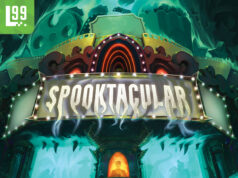Note: This preview uses pre-release components and rules. What you see here may be different from the final, published game. This post was a paid preview, you can find out more information here.
 The world is ending and no one seems to be helping. Things are in disarray. The outcomes look bleak. You have been called upon to end this invasion of big monsters. Do you have what it takes? In The Bad Karmas and the Curse of the Zodiac (henceforth The Bad Karmas for brevity), you and up to three other players will take on an array of bosses who embody aspects of the Zodiac signs. It won’t be easy, and working together will be key. In today’s preview, I’ll be covering two things: The Bad Karmas and the technology running alongside the game, the Teburu system, both of which are developed by Xplored.
The world is ending and no one seems to be helping. Things are in disarray. The outcomes look bleak. You have been called upon to end this invasion of big monsters. Do you have what it takes? In The Bad Karmas and the Curse of the Zodiac (henceforth The Bad Karmas for brevity), you and up to three other players will take on an array of bosses who embody aspects of the Zodiac signs. It won’t be easy, and working together will be key. In today’s preview, I’ll be covering two things: The Bad Karmas and the technology running alongside the game, the Teburu system, both of which are developed by Xplored.
Gameplay Overview:
The goal of The Bad Karmas is to defeat the Zodiac before all your characters die. Each character has a unique role in helping the team. The Defender, who wields a shield and shotgun, is the healer for the group; the Demolisher, brings the pain with his ax and is the tank; the Assassin is the stealthy rogue who can jump in, smack smack smack, and jump out; and the Sharpshooter deals damage from a distance with her bow and is decked out in pink, making even Bret the Hitman Hart jealous.
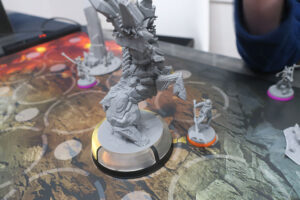
According to the developers, each boss in The Bad Karmas will present a different challenge and fighting style, so your approach will have to adapt. During my preview, I was only able to play against Aries, but I’ve been told that all twelve Zodiacs are planned for the game. Additionally, there will be a story-driven campaign mode, where you’ll be able to level up your heroes, as well as a standalone skirmish mode. If that interests you, be sure to keep an eye on the developments during the campaign.
The game is played over a series of rounds. At the beginning of each round, players will choose the order of their turns and what stance they will assume. This stance will give a benefit, such as giving them extra movement or health, and a defense against a negative status that affects which cards they can play.
On your turn, you’ll be able to move your character up to two spaces and play a card. Cards will be either ranged attacks, melee (close attacks), or a buff. These are unique to the characters and fit their fighting classes. It’ll be important to use the cards at the right time because most cards have a cooldown period before they can be used again. Cards can even get added to your deck for actions you take, such as healing or dealing a certain amount of damage throughout the game. After you’ve taken your movement and played your card, the boss will take theirs in this alternating order until the end of the round.
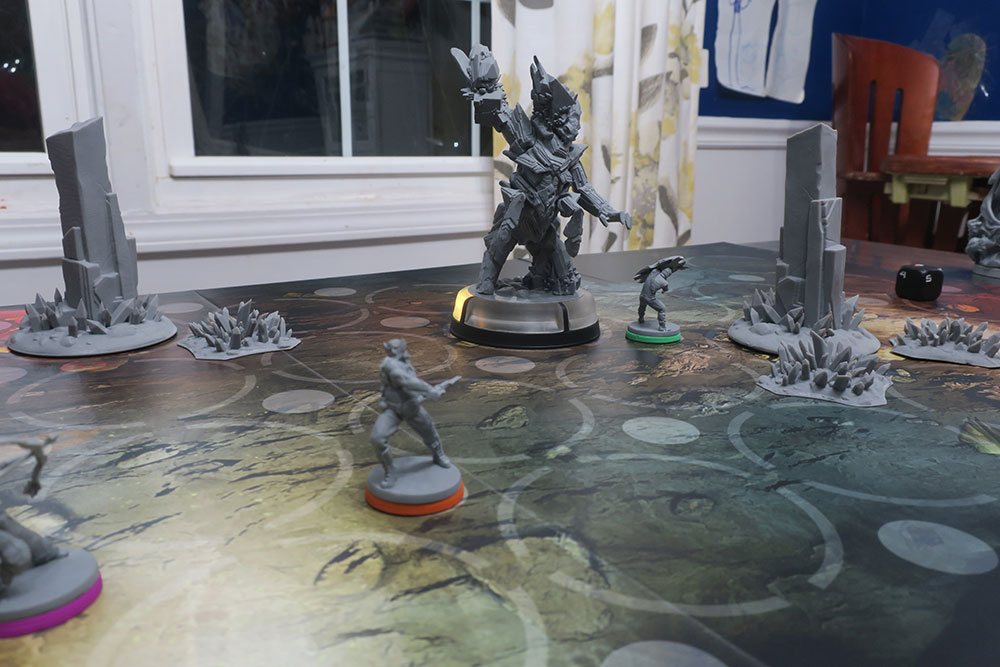
Gameplay Impressions:
While The Bad Karmas has a traditional board game look to it, with dice and miniatures moving about the board, there’s also an app that will be used in tandem with the Teburu system throughout the game. An iPad or similar electronic will be needed for the overall management of the game, similar to what you see in DropMix or Return to Dark Tower. This device will help set up the game and will be the focal point for actions and changes during gameplay. I did find that it required an internet connection during setup, but this could change as the development continues. I was using beta software so there will certainly be changes before shipping.
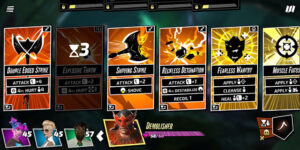
The app handles a lot of bookkeeping, from every cards’ cooldown timer, the health and damage applied (including any modifiers), and status effects. You won’t need physical cards, as they’ll all be accessible for players on their devices. If you’re an avid solo player, you’ll appreciate not needing to manage the opponent and their actions, as well as your own.
While I played The Bad Karmas, it was such an easy experience playing by myself, and with all four characters. I decided turn orders, where characters would move, and what cards they would play. I rolled the dice when needed and responded to changes, like when Aries threw me across the map. I know some people are going to be turned off by this game, just because there’s an electronic component, so I’m not going to try and change your mind. But, it takes aspects of the game that would be otherwise tedious and slowed down and allows you to simply focus on playing and enjoying the game. That’s awesome.
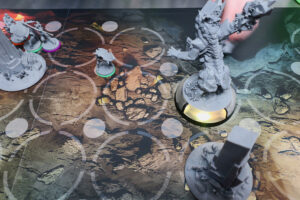
The Bad Karmas isn’t just app-driven, however. That’s where the Teburu system comes into play. I’ll share with you as much as I know about it and what I have gleaned from my own experience. You might recognize the name Teburu if you went to GenCon 3000 years ago in 2019. There, it was featured in a secret CMON booth showing what it could provide to a game experience like Zombicide. I think most of us didn’t hear much about it after that point and probably forgot about it until now. The Teburu system is a powered board, which sits underneath the game board. It currently needs to be plugged into a wall outlet, but I would imagine a power bank could work when power is otherwise not readily accessible.
It pairs with the devices used during the game via Bluetooth, but also has the ability to be linked with a game remotely, allowing people to play a game electronically, similar to how people might play chess when they aren’t in the same place. It also pairs with the dice used in the game. They feel nice in the hand and whenever you roll them, the game knows the result and applies it appropriately to the situation, keeping you focused on the gameplay.

I noticed each of the characters had a magnetized base to them, which the board used to track their position and how many steps they had taken for their turn, correcting you if you went one too many. I don’t know all the ins and outs of this system, or even what its full capabilities are. But what I’ve seen that it can provide when coupled with a competent app is a smooth gameplay experience. I would guess that The Bad Karmas is a showpiece of what this system can do, and would perhaps spark future developers in their creations.
I know a lot of previews for crowdfunded games tend to get overhyped. I get it. It’s something new and exciting and not many people have gotten to try it. Readers might forget that what most of us receive for previews is not the final product that will be shipped to you. The gameplay might change and components and art might be altered. Keeping all that in mind, I’ll get to my final thoughts on the game.
Final Thoughts:
The Bad Karmas and the Curse of the Zodiac was a very unique and different experience, in a good way. I haven’t had the time or energy to really get a board game out and play it solo for a while. But this experience changed that by minimizing components I needed to get out and aspects to the game I had to manage. It let me, even when my personal bandwidth was low, play a board game again and actually enjoy it.
I’ve liked skirmish games such as Unmatched and Undaunted, and this was no different. It was neat to discover things about the game that weren’t readily apparent, like a hidden special weapon that could be picked up, or what happens if you push a Zodiac into spikes. I have some concerns about portability when power or internet might not be readily available, but these may have solutions down the road. While I didn’t get to experience the entirety of what the final game will offer, I am enticed to see what that experience will look like.
The Bad Karmas and the Curse of the Zodiac launches onto Kickstarter later this month. So keep an eye out for this one if you are intrigued.









